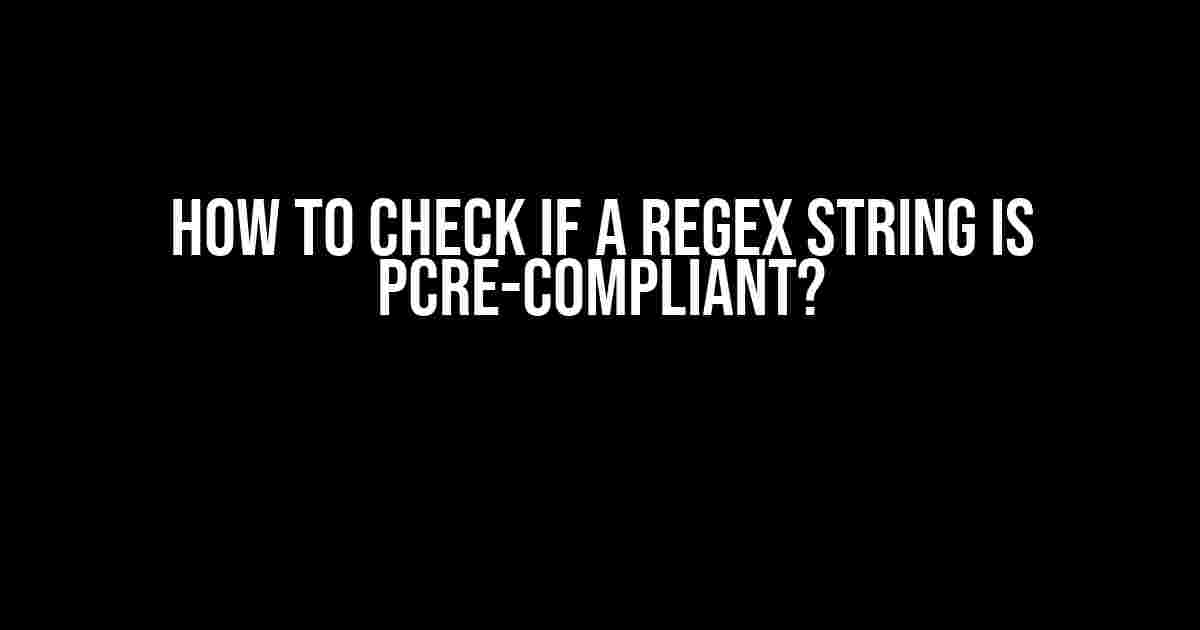Are you tired of dealing with regex strings that don’t play nice with your PCRE-enabled tools? Do you struggle to determine whether your regex pattern is compatible with the Perl-Compatible Regular Expressions standard? Worry no more, dear regex enthusiast! In this article, we’ll dive into the world of PCRE compliance and provide you with a step-by-step guide on how to check if a regex string is PCRE-compliant.
What is PCRE?
Before we dive into the meat of the matter, let’s quickly cover the basics. PCRE stands for Perl-Compatible Regular Expressions, a regex flavor developed by Philip Hazel. It’s a widely-used and powerful regex engine that’s compatible with Perl, Python, PHP, and many other programming languages.
PCRE is known for its flexibility and feature-rich syntax, making it a popular choice among developers and regex enthusiasts. However, its unique features can sometimes lead to compatibility issues with other regex flavors.
Why is PCRE Compliance Important?
PCRE compliance is crucial because it ensures that your regex patterns work seamlessly across different platforms and tools that support PCRE. Without compliance, your regex patterns might behave unexpectedly, leading to errors, misinterpretation, or even security vulnerabilities.
Here are a few scenarios where PCRE compliance is particularly important:
- Platform inconsistencies: PCRE is widely used in various platforms, such as PHP, Python, and Apache. Ensuring PCRE compliance ensures that your regex patterns work as intended across these platforms.
- Tool integrations: Many tools, like sed, awk, and grep, rely on PCRE. Compliant regex patterns ensure that these tools work correctly and efficiently.
- Regex engine limitations: Some regex engines, like JavaScript’s, have limitations compared to PCRE. Compliant regex patterns can be adapted to work within these limitations.
How to Check if a Regex String is PCRE-Compliant?
Now that we’ve established the importance of PCRE compliance, let’s get to the good stuff! Here are the steps to check if a regex string is PCRE-compliant:
Method 1: Use Online Regex Tools
One of the easiest ways to check PCRE compliance is to use online regex tools like Regex101, Regexr, or Regex Tester. These tools allow you to input your regex pattern and test it against different regex flavors, including PCRE.
Here’s how to do it on Regex101:
- Navigate to Regex101 and enter your regex pattern in the input field.
- Select “PCRE” as the regex flavor from the dropdown menu.
- Click the “Test” button to see if your regex pattern is PCRE-compliant.
If your regex pattern is PCRE-compliant, you’ll see a green tick mark and a “Valid” status. If not, Regex101 will provide you with an error message indicating the incompatible feature or syntax.
Method 2: Use Command-Line Tools
Another way to check PCRE compliance is to use command-line tools like `pcretest` or `perl` with the `-E` flag.
Here’s an example using `pcretest`:
$ pcretest Regex pattern: your_regex_pattern_here
If your regex pattern is PCRE-compliant, `pcretest` will output the pattern’s syntax tree. If not, it will display an error message.
Method 3: Write a PCRE-Enabled Script
You can also write a script in a PCRE-enabled language like PHP or Python to test your regex pattern.
Here’s an example in PHP:
<?php
$pattern = '/your_regex_pattern_here/';
$string = 'test_string';
if (@preg_match($pattern, $string)) {
echo "Pattern is PCRE-compliant!";
} else {
echo "Pattern is not PCRE-compliant.";
}
?>
Run the script, and if your regex pattern is PCRE-compliant, you’ll see the success message.
Common PCRE-Incompatible Features
When checking for PCRE compliance, it’s essential to be aware of features that are not supported or differently implemented in PCRE. Here are some common PCRE-incompatible features:
| Feature | PCRE Implementation |
|---|---|
| Unicode properties | Supported, but with different syntax |
| Character class subtraction | Not supported |
| Recursive patterns | Supported, but with limitations |
| CONDITIONAL PATTERN | Supported, but with different syntax |
| CALL AND RECURSION | Supported, but with limitations |
These features might be implemented differently or not at all in other regex flavors. Be sure to check the documentation for your target platform or tool to ensure compatibility.
Conclusion
Checking if a regex string is PCRE-compliant is a crucial step in ensuring that your regex patterns work correctly across different platforms and tools. By using online regex tools, command-line tools, or writing a PCRE-enabled script, you can easily verify PCRE compliance. Remember to be aware of common PCRE-incompatible features and adjust your regex patterns accordingly.
With this comprehensive guide, you’re now equipped to tackle PCRE compliance and take your regex skills to the next level. Happy regexing!
Frequently Asked Question
Are you struggling to determine if a regex string is PCRE-compliant? Fear not, friend! We’ve got the answers to your burning questions right here.
What is PCRE and why does it matter?
PCRE stands for Perl-Compatible Regular Expressions, a flavor of regex that’s widely used in many programming languages. Ensuring your regex string is PCRE-compliant guarantees compatibility and accurate pattern matching across different platforms.
How do I test if my regex string is PCRE-compliant?
You can test your regex string using online tools like Regex101 or Debuggex, which support PCRE syntax. These tools will highlight any syntax errors or incompatible patterns, ensuring your regex is PCRE-compliant.
What are some common non-PCRE features to watch out for?
Some regex flavors, like JavaScript or Python, have unique features that aren’t part of the PCRE standard. Be cautious of features like JavaScript’s `RegExp.prototype.test()` or Python’s `re.VERBOSE` flag, which might not be compatible with PCRE.
Can I use PCRE-compliant regex strings in non-PCRE environments?
While it’s possible to use PCRE-compliant regex strings in non-PCRE environments, you might encounter issues or limitations. For example, JavaScript’s regex engine doesn’t support certain PCRE features like recursive patterns or possessive quantifiers. Always test your regex strings in the target environment to ensure compatibility.
Are there any resources for learning more about PCRE regex?
Absolutely! The official PCRE documentation is a comprehensive resource, and sites like Regex101, Stack Overflow, and Regexr offer tutorials, examples, and a community-driven Q&A platform to help you master PCRE regex.


